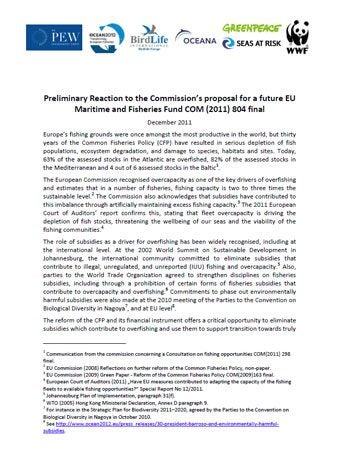Report | diciembre 20, 2011
Preliminary reaction to European Maritime and Fisheries Fund proposal
Europe’s fishing grounds were once amongst the most productive in the world, but thirty years of the Common Fisheries Policy (CFP) have resulted in serious depletion of fish populations, ecosystem degradation, and damage to species, habitats and sites. Today, 63% of the assessed stocks in the Atlantic are overfished, 82% of the assessed stocks in the Mediterranean and 4 out of 6 assessed stocks in the Baltic.
The European Commission recognised overcapacity as one of the key drivers of overfishing and estimates that in a number of fisheries, fishing capacity is two to three times the sustainable level.2 The Commission also acknowledges that subsidies have contributed to this imbalance through artificially maintaining excess fishing capacity. The 2011 European Court of Auditors’ report confirms this, stating that fleet overcapacity is driving the depletion of fish stocks, threatening the wellbeing of our seas and the viability of the fishing communities.
The role of subsidies as a driver for overfishing has been widely recognised, including at the international level. At the 2002 World Summit on Sustainable Development in Johannesburg, the international community committed to eliminate subsidies that contribute to illegal, unregulated, and unreported (IUU) fishing and overcapacity. Also, parties to the World Trade Organization agreed to strengthen disciplines on fisheries subsidies, including through a prohibition of certain forms of fisheries subsidies that contribute to overcapacity and overfishing. Commitments to phase out environmentally harmful subsidies were also made at the 2010 meeting of the Parties to the Convention on Biological Diversity in Nagoya, and at EU level.
The reform of the CFP and its financial instrument offers a critical opportunity to eliminate subsidies which contribute to overfishing and use them to support transition towards truly sustainable fisheries and towards achieving healthy marine ecosystems. The following document is an initial reaction by BirdLife Europe, Greenpeace, Oceana, the Pew Environment Group, Seas At Risk, WWF and the OCEAN2012 coalition to the Commission’s proposal. In particular, it indicates which parts of the proposal these groups welcome, and where they have concerns and see room for improvement.


